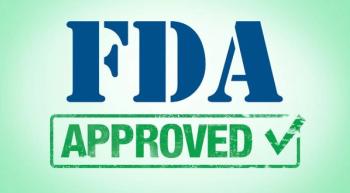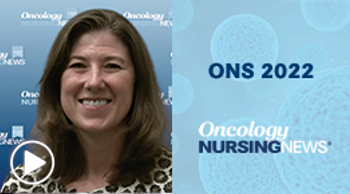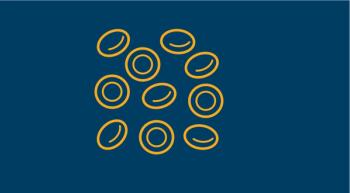
Laura J. Zitella, MS, RN, ACNP-BC, AOCN, recounts key nursing considerations with targeted therapy for chronic lymphocytic leukemia, and third-line diffuse large b-cell lymphoma options.

Laura J. Zitella, MS, RN, ACNP-BC, AOCN, recounts key nursing considerations with targeted therapy for chronic lymphocytic leukemia, and third-line diffuse large b-cell lymphoma options.

Nurse investigators characterized the onset and management of edema and effusion with loncastuximab tesirine in the pivotal LOTIS-2 trial.

Tisagenlecleucel received accelerated approval from the FDA for the treatment of adult patients with relapsed or refractory follicular lymphoma following 2 or more lines of systemic therapy.

Laura Zitella, MS, RN, ACNP-BC, AOCN, discusses third-line treatment options for patients with diffuse large b-cell lymphoma.

Very low dose radiation therapy was found to be an effective treatment approach in the palliative setting for patients with indolent non-Hodgkin lymphoma.

Patients with relapsed/refractory large B-cell lymphoma continued to derive benefit from lisocabtagene maraleucel after 2 years of follow-up.

Patients with relapsed or refractory large B-cell lymphoma experienced improved overall survival following treatment with axicabtagene ciloleucel.

Patients with heavily pretreated lymphoma experienced promising clinical responses following treatment with the innate cell engager AMF13 plus preactivated and expanded natural killers (NK) cells.

Axicabtagene ciloleucel is now FDA-approved for the treatment of adult patients with large B-cell lymphoma that is refractory to first-line chemoimmunotherapy or relapses within 12 months of first-line chemoimmunotherapy.

Duvelisib, a dual PI3K-δ,γ inhibitor, is now listed as a category 2A designated option for second-line and subsequent treatment of patients with relapsed/refractory peripheral T-cell lymphoma in the National Comprehensive Cancer Network Clinical Practice Guidelines.

The FDA set the Under the Prescription Drug User Fee Act date for June 24, 2022.

Frontline treatment with brentuximab vedotin and chemotherapy yielded superior survival outcomes in patients with advanced classical Hodgkin lymphoma.

Ibrutinib plus rituximab is effective, easy to administer, and removes the need for chemotherapy in older patients, say experts.

A comparative analysis indicated that lisocabtagene maraleucel generated superior quality of life in patients with relapsed/refractory large B-cell lymphoma compared with the current standard of care.

Axicabtagene ciloleucel improved the quality of life in patients with relapsed/refractory large B-cell lymphoma receiving the agent as a second-line therapy.

Combining ibrutinib with rituximab resulted in improved 2-year progression-free survival among elderly patients with previously untreated diffuse large B-cell lymphoma.

The FDA has approved the combination of rituximab plus chemotherapy to treat children aged between 6 months and 18 years who have advanced-stage, CD20-positive diffuse large B-cell lymphoma (DLBCL), Burkitt lymphoma (BL), Burkitt-like lymphoma (BLL), or mature B-cell acute leukemia (B-AL).

Parsaclisib has been granted a priority review for 3 indications that include relapsed or refractory follicular, marginal zone, and mantle cell lymphoma.

Zanubrutinib received an accelerated approval for the indication of adults with marginal zone lymphoma with at least 1 prior treatment with an anti-CD20-based therapy.

Kelly Garvin, BSN, RN, OCN, discusses the impact of CAR T-cell therapy on patients and how nurses care for them, as well as her expectations on how indications will grow.

Tisagenlecleucel is a CAR T-cell therapy approved to treat follicular lymphoma that has minimal toxicity and is safe in the outpatient setting.

Treating patients with brentuximab vedotin in combination with doxorubicin, vinblastine, and dacarbazine with and without consolidative radiotherapy resulted in strong efficacy and encouraging tolerability in early-stage, unfavorable-risk Hodgkin lymphoma.

More data are needed regarding the duration of response associated with this combination to make it a “mainstream” treatment option for patients, according to an expert from the University of Michigan Rogel Cancer Center.

Discrepancies exist between actual patterns of care and recommendations based on clinical trials in adult patients with mantle cell lymphoma.

The second-generation 4-1BB bi-specific CAR T-cell therapy was efficacious and safe in treating patients with relapsed/refractory B-cell non-Hodgkin lymphoma.